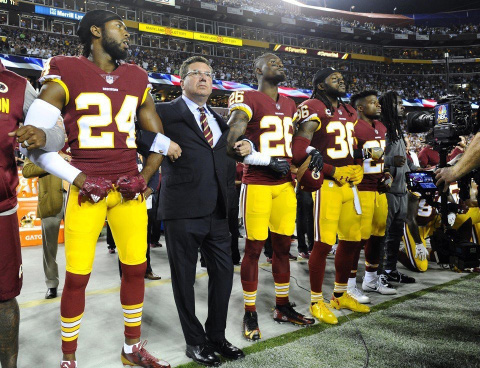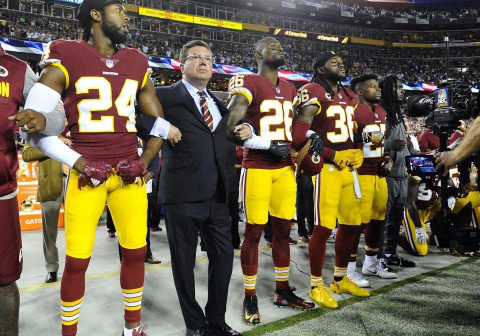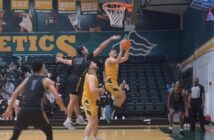
A poll conducted by USA Today found that over two-thirds (68 percent) of responders said that Trump’s call for NFL owners to fire players and for fans to boycott their game was inappropriate. Twenty-seven percent of responders agreed with the President’s response
Credit:@theatlantic
By Travis Farmer
In recent months, there has been a growing sentiment among professional athletes to kneel during the national anthem at sporting events. This action has been done for a myriad of reasons and has attained many different opinions from many sides. With attitudes ranging from full-on support to violent condemnation, the anthem and the flag have become another battleground for a nation already viciously divided.
The controversy began in 2016 with Colin Kaepernick, the then-starting quarterback of the San Francisco 49ers, sitting during the playing of the Star-Spangled Banner at an NFL game.
Throughout the season, the sitting became kneeling during the anthem after Kaepernick consulted Nate Boyer, another NFL player, and Green Beret military veteran. Kaepernick stated that the kneeling was out of respect for former and acting military members and that it was what Boyer advised Kaepernick to do rather than sitting. Kaepernick also stated that the action was in protest of the recent highly publicized shootings of various African Americans by police officers. The same events that led to the formation of the Black Lives Matter movement also led to Kaepernick’s kneeling.
During the 2017 season, Kaepernick became a free agent, meaning that he was no longer the starting quarterback for the 49ers. Throughout the season, he remained unemployed, leading many to wonder about the true reason why he was remaining unsigned.
Statistics website FiveThirtyEight concluded that it is “…obvious Kaepernick is being frozen out for his political opinions.” The site used the Total Quarterback Rating, an objective way to rate quarterbacks created by ESPN, to say that Kaepernick is an “above average” quarterback and that no other player with skill similar to him had remained unemployed as long as he had.
This dispelled the belief that Kaepernick was remaining unsigned due to his skill and not his political statements. In March, President Trump took credit for Kaepernick remaining unemployed. Trump stated that no team would sign Kaepernick because they were afraid that he (Trump) would use Twitter and his position to create a “PR crisis.” This led to a very concerning thought that Trump would later expound on: is it right for the President to call for somebody to be unemployed?
Just this past September, after a few months of continued racial tensions and kneeling protests, Trump took to Twitter to say that NFL players who did not stand during the national anthem should be fired or suspended. This led to national outcry and support for the movement, leading to the trending of #TakeAKnee on Twitter. Many players and celebrities from all backgrounds came out of the woodwork to voice their opinions on Trump, the NFL, and the anthem.
Some people cited that the players’ free speech gave them the right to do whatever they like, as it is not illegal to kneel during the anthem. Other people voiced their support for Trump, citing that you do not have a right to free speech when you are at work. However, this is not a matter of the players versus the teams’ coaches and owners. Many coaches and team owners have also recently taken a knee or even stayed in the locker rooms during the playing of the anthem. An example of this is Jerry Jones, owner of the Dallas Cowboys, who took a knee with his players.
Many people are arguing that Trump is using intimidation and threats in stating that players should be fired for exercising their freedom of speech. There have even been lawsuits filed, with Democratic lawyers citing that Trump is violating 18 U.S. Code § 227, which makes it a federal crime for any government employee to influence or threaten to influence a private company’s employment decisions. If violated, the code has the ability to fine the perpetrator or to sentence them to as many as 15 years in prison.
Even more people on social media and news pundits have pointed out the unfairness of Trump calling athletes who kneel in protest “sons of bitches” while calling the white supremacists who attended the deadly Charlottesville protests “very fine people.”
Athletes from other sports have also expressed their displeasure towards Trump, with Stephan Curry of the Golden State Warriors basketball team denying Trump’s invitation to the White House. After Curry’s denial, Trump tweeted that the invitation was withdrawn, leading to Lebron James noting in a tweet at Trump that there was no invitation to withdraw if Curry had already declined, even calling the President a “bum.”
Dale Earnhardt Jr., NASCAR royalty to many fans of the very conservative-leaning sport, also took the side of the kneeling movement. He tweeted that all Americans are granted rights to peaceful protest, adding a John F. Kennedy quote that reads, “Those who make peaceful revolution impossible will make violent revolution inevitable.” This tweet came only moments after Trump spoke in support of NASCAR owners stating that any driver who did not stand for the anthem would be fired.
In times of a nation so divided, it is important for people to be able to speak their minds. With athletes, especially major stars like Lebron James and Stephen Curry that have so many children and teenaged fans that look up to them, it would almost be a disservice to the country not to speak their minds and give their fans the bravery to also speak for what they believe in.
If athletes feel so strongly about something that they believe, they should speak about it on their platforms. It would be irresponsible for them not to do so. If free speech and peaceful protest are stifled, then what else is there to do?





